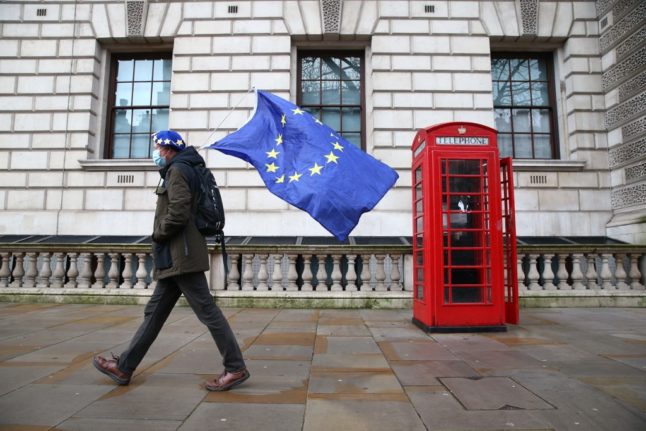Spain’s Council of Ministers has approved a series of subsidies for the “ICEX-Brexit” program, which according to the Ministry of Industry, Trade and Tourism, are intended to “compensate for the negative effects of the United Kingdom’s withdrawal from the European Union on companies and the self-employed.”
This subsidies will largely be for businesses that have seen their exports reduced as a result of Brexit, or because they have lost their investments, and aim, according to the Ministry, “to establish transitional measures to help exporting companies absorb the shock that Brexit is having in terms of increased costs, new procedures and administrative obligations.”
READ ALSO: More than 2,800 Brits ordered to leave European countries since Brexit
On top of that, the Ministry has also pledged they will help Spanish companies strengthen their presence in the British market, and will support the creation of jobs in sectors that export to the United Kingdom.
According to Spain’s Official State Bulletin (BOE), the subsidy amount will be 75 percent of the expenses considered eligible according to the requirements, which are outlined below, with a maximum support of €200,000 per beneficiary.
These grants will be financed from the ICEX budget and the funds of the Brexit Adaptation Reserve or BAR funds.
“The planned aid will have a direct positive impact on the productivity and competitiveness of the economy and the improvement of employment, since it will allow Spanish companies that export to and have a presence in the UK market to progressively absorb the effects of the country’s exit from the EU,” the Ministry of Industry, Trade and Tourism explained.
Brexit effect
As the drawn out Brexit process rumbled on from 2016, the Spanish government studied carefully the possible effects that Brexit would have on the Spanish economy. With all the possible contingencies considered, the conclusion was that Brexit would have negative consequences for both GDP and employment in Spain, as well as for foreign trade and investment that the Spanish economy receives.
Many Spanish companies have suffered as a result, and this subsidy programme is intended to mitigate some of these consequences. According to Royal Decree 114/2023, published February 21st, companies legally incorporated in Spain or self-employed workers registered in Spain’s Special Regime for Self-Employed Workers, exporters to the United Kingdom, or companies with investments in the United Kingdom “who have been harmed by Brexit” could qualify.
Though the application process has yet to be outlined in any great deal, companies and self-employed people must justify why they qualify for the subsidy and how exactly their business has been effected by Brexit.
Companies and self-employed workers may belong to any sector of activity affected by Brexit. However, it is worth noting that the BOE states that companies “that benefit from the United Kingdom’s withdrawal from the Union, including those in the financial sector, must be taken into account” and are likely ineligible.
Grants will be granted on a direct basis. Companies legally incorporated in Spain, or Spain-based self-employed workers, Spanish companies that export to or with investments in the United Kingdom who have been negatively impacted by Brexit could be eligible and can apply.
READ ALSO: Brexit: Brits in EU feel European and don’t want to return home
Requirements
Companies and self-employed people wanting to apply for the subsidy must meet the following the requirements:
- Not have any debts for the reimbursement of aid or loans with the government, or with ICEX, and in particular, not having outstanding repayment obligations for any other loans or advances granted previously against the credits specifically allocated for the management of these funds.
- Be up to date with tax and social security obligations.
- To have authorised the Customs and Special Taxes Department of Spain’s tax agency to send ICEX information on applicant’s foreign trade and investments.
- Not to be affected by any of the circumstances listed in sections 2 and 3 of Article 13 of Law 38/2003, of 17 November, which you can find here.
- In the case of subsidies over €30,000, companies that fail to comply with the payment deadlines referred to in Article 13.3 bis of Law 38/2003 will not be considered beneficiaries.
Acceptable charges and expenses
The Spanish government has also outlined the types of things that can and can’t be justifiably compensated by the ICEX-Brexit fund.
Relocation expenses for businesses cannot be claimed for subsidy, neither can travel, accommodation or food expenses.
According to the BOE, in order to qualify for the subsidy an expense or charge is “will be considered a completed expense [if it] has been actually paid prior to the end of the justification period determined by the regulations governing the subsidy.” That is to say, by December 31st, 2023.
Some of the acceptable expenses include:
- New export costs or charges to the United Kingdom as a result of its departure from the EU: such as costs accused getting advice regarding new requirements; the cost of new certifications required for the product or service; the registration of trademarks and designations of origin; and the costs of licenses, applications and visas.
- Consolidation expenses in the UK market through a greater physical and brand presence to cushion the negative impact of Brexit.
- Previous expenses, including initial incorporation and startup costs: feasibility studies; incorporation expenses; branch or office costs; or the costs of external advice.
- Promotional expenses in the British market: market research; the creation and dissemination of promotion material; contracting of specialised services and advisors; advertising costs; marketing actions; commercial sponsorships; public relations; participation in trade fairs.
- Trademark and homologation costs: registration of patents and trademarks; defence of the trademark; approvals and certifications; legal costs.



 Please whitelist us to continue reading.
Please whitelist us to continue reading.
Member comments